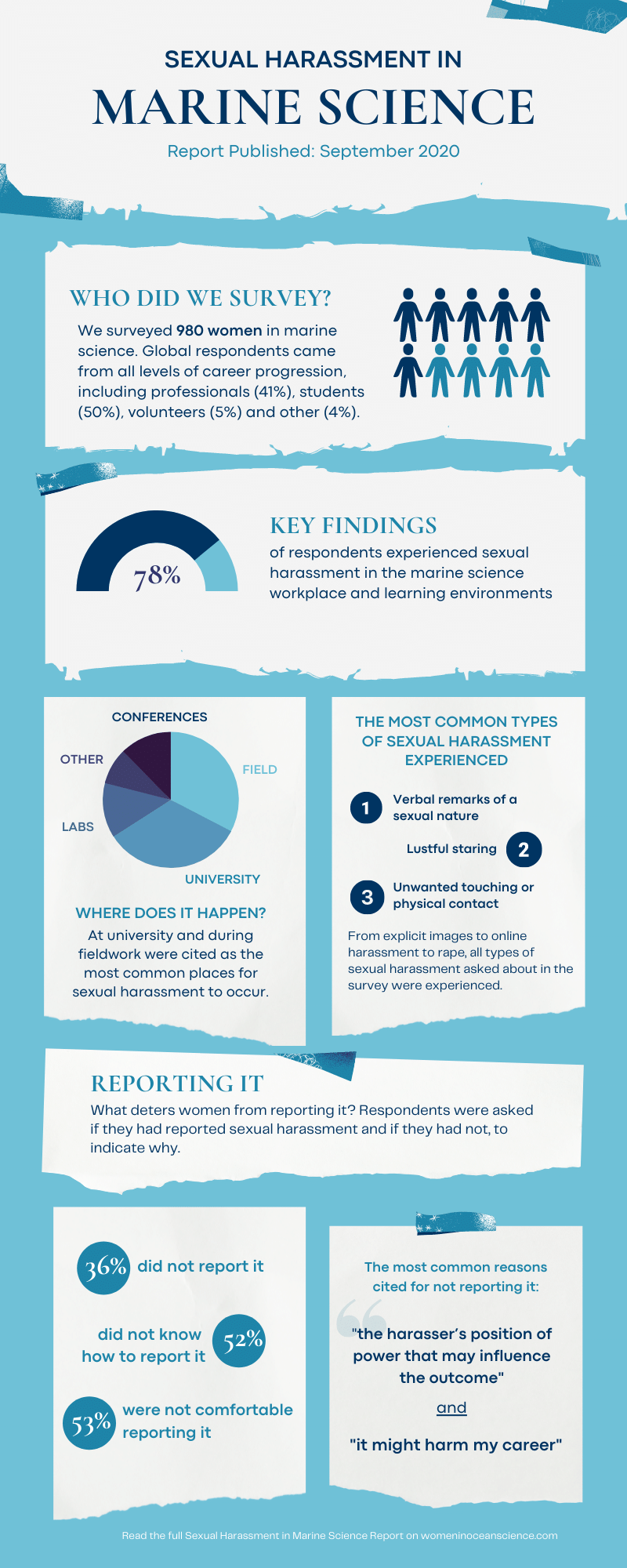Landmark Survey Show 78% of Women in Marine Science Experience Sexual Harassment
Women in Ocean Science C.I.C. has just released results from the first ever large-scale female sexual harassment in marine science survey, which investigates the prevalence of sexual harassment in the marine science workplace and learning environments – and what deters women from reporting it.
The report shows that 78% of survey respondents had experienced sexual harassment in their marine science workplace or learning environment – putting marine science ahead of other science disciplines for prevalence of sexual harassment.
University and during fieldwork were the most common places for sexual harassment to occur and verbal remarks of a sexual nature, lustful staring and unwanted touching or physical contact were the most frequently experienced types of harassment.
Responses also raised serious questions about power differentials and confidence in reporting harassment. 1 in 2 respondents would not feel comfortable reporting sexual harassment and the most common reasons cited for not reporting it were: “It might harm my/the victim's career” and “The harasser is in a position of power that may influence the outcome”.
The online survey, published on International Women’s Day 2021, received just under a thousand responses from voluntary female participants. Having examined the responses, WOS hopes that these results will drive action into addressing sexual harassment within marine science sectors. WOS is looking to secure funds for further project development to address the issues.
More can be read about this survey and Women In Ocean Science’s work at womeninoceanscience.com/sexual-harassment
Quotes
Madeline St Clair, 25, Founder of Women in Ocean Science C.I.C. and report author said:
“From physical acts of sexual assault and rape to the tired “it’s just a joke” narrative that normalises harassment - this survey highlights just how important it is to ensure that we are creating a safe space for all in marine science. It not only raises serious questions as to whether current reporting systems are effective (or even in place at all) but to whether we are failing to diffuse the power dynamics that enable harassment to persist.”
“Whilst it’s disappointing – but not wholly unexpected – to see in numbers for the first time how pervasive this issue is for women in the marine science workplace and learning environments in this survey, what’s even more worrying, is to see that women are deterred from reporting it. 1 in 2 women would not feel comfortable reporting it.”
For more information please contact: Madeline St Clair hello@womeninoceanscience.com
Notes to Editor
Women in Ocean Science C.I.C. (WOS) is a non-profit female empowerment organisation, with a global, online community of over 50 000 across social platforms. WOS has represented women in the marine science workplace and learning environments since its inception in 2018, when the initiative was founded by tropical marine biologist, Madeline St Clair. WOS’s mission is to celebrate and empower women and to push for equality and diversity within the marine science workforce.

